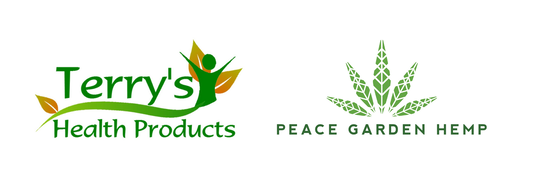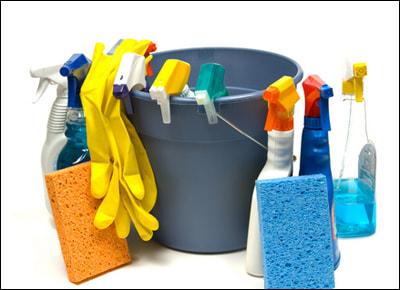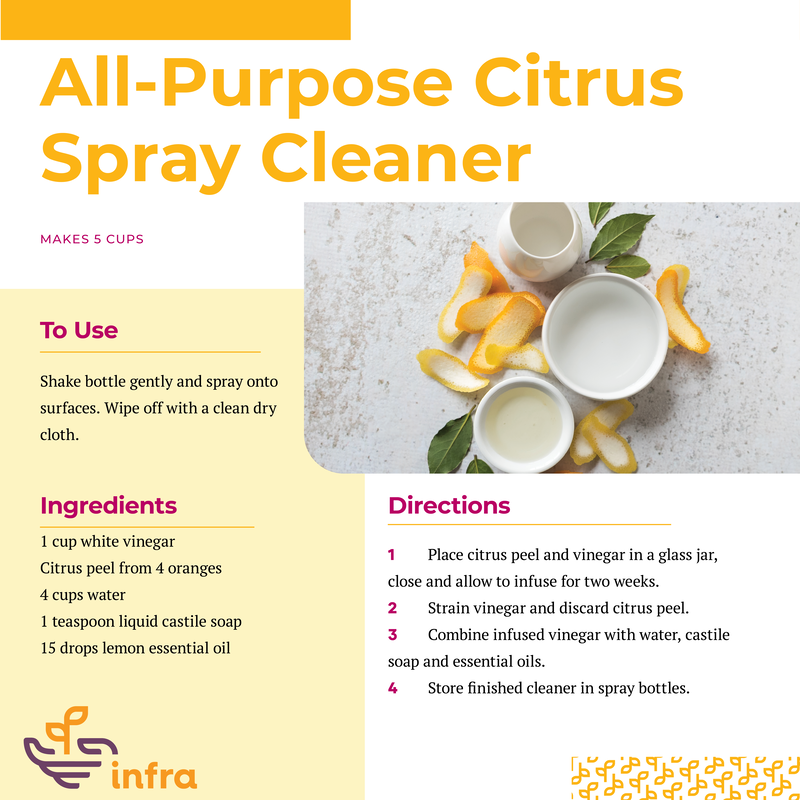|
March is Spring Cleaning month!
Before we get started with the cleaning, let's talk about cleaning up our cleaners. That's right! If you're cleaning with conventional cleaning products, chances are you're just trading dust, dirt, and germs for toxic chemicals. Is your counter really cleaner because you left endocrine disruptors, lung and skin irritants, antibacterial agents, and neurotoxins on it when you wiped it with a cleaner?
Grab your bottles of cleaners and read the ingredient labels, even your "natural" and "green" ones. Do they contain these ingredients?
Triclosan
You might remember this chemical as the antibacterial agent that the FDA banned from handsoap back in 2016 because of the lack of evidence of its safety. The FDA found that it is a hormone disruptor in animals, creates antibiotic resistant germs, and weakens our immune systems. They did not, however, ban it from all consumer products. Killing bad bacteria might sound like a good idea, but it kills all bacteria, even the good ones. Bacteria keep our environment and bodies functioning in balance. We take probiotic supplements to have enough bacteria in our guts to support our immune system, digestion, skin health, and overall well being. Destroying too much bacteria will weaken our health because the good bacteria supports our immune systems, skin, brains, saliva - every function in our bodies! Another issue is that the more antibacterial products we use, the more bacteria must evolve to survive. We are now facing a new threat: antibiotic resistant bacteria and "superbugs." Washing away the bacteria with clean soap is enough to get rid of it. Read more about Triclosan here
Chlorine
Chlorine is a sanitizer, but it's powerful enough that it was used as a weapon in World War I. The trouble with it is in the concentration we are exposed to on a regular basis. Chlorine is in our water, and it is in our indoor air from the fumes of cleaners and tap water. It sanitizes our skin and lungs when we're exposed to it, which kills our good bacteria that we need to function and be healthy. The EPA recognizes that it is a respiratory, eye, and skin irritant. Read the EPA's report on Chlorine
Ammonia
This is a solvent often used in glass cleaners, because it prevents streaking. Ammonia works well, but it's a powerful reparatory irritant because its fumes are easily inhaled. It is especially troubling for people with asthma and lung issues. Long term exposure to it is known to lead to bronchitis. The trouble doesn't end here. Healthy people can convert ammonia to urea that gets excreted out. In people with weak liver function or certain genetic mutations, however, ammonia can build up in the blood and cause ammonia toxicity. Ammonia toxicity impairs brain function, causes seizures, and could lead to coma or death. Read more about it here
Perchloroethylene ("Perc")
This is the main solvent in dry cleaning solutions, but it's also added to carpet shampoos, stain removers, and metal degreasers. The EPA has classified it as a possible carcinogen, and New York Attorney General’s office recognizes it as a neruotoxin. People who live near dry cleaners have reported dizziness and loss of coordination, and upon investigation Perc was found to be the culprit. In 2020 the EPA ordered that dry cleaners in residential areas must phase out their use of Perc. It is still in many consumer products. Read what the CDC says about it here
Fragrance
The word "fragrance" in an ingredient list can mean almost anything, because it's made from proprietary ingredients protected by law. The word "fragrance" can easily mean hundreds of synthetic chemicals, some of which have been studied and many of which have not been. The problem is that many common ingredients used to make synthetic fragrances are known endocrine disruptors, neurotoxins, respiratory irritants, carcinogens, and allergens. If the ingredients say "natural fragrance" or "made from essential oils," it doesn't mean it's clean. Essential oils are not always sourced without pesticides. They also might not be pure, meaning they can be conditioned with synthetic perfuming agents or stabilizers to make the scents last longer. Buy from companies that give you full transparency over how they make their fragrances, or buy fragrance free cleaners. Your house will smell better just by cleaning it! Phthalates This one is a trick, because you probably won't see it on the ingredient label. It is a key ingredient in "fragrance." Phthalates are endocrine disruptors, meaning they act like hormones in our bodies and disrupt the jobs of our natural hormones, reduce sperm count, increase the effects of estrogen, lead to thyroid troubles, and more. See our last blog post on Xenoestrogens to learn more about endocrine disruption. Read more about fragrances and phthalates
2-Butoxyethano
This is another trick, because it is also not required to be listed in the ingredients. It belongs to a category of "glycol ethers," solvents that prevent streaking. It is commonly found in glass cleaning products for this reason, sometimes as an alternative to ammonia. It is also an effective paint stripper and is known to cause workplace safety concerns. It might also be found in fragrances. The EPA recognizes acute and chronic exposure symptoms for this chemical. Acute symptoms to high levels cause narcosis, pulmonary edema, and severe liver and kidney damage. Acute symptoms to low levels cause conjunctivitis, upper respiratory tract irritation, headache, nausea, and temporary corneal clouding. Chronic exposure to it in humans results in fatigue, lethargy, nausea, anorexia, tremor, and anemia. Read more about what the EPA says about it here
Have we studied the Long Term Effects of Using Cleaners?
A 20 year study on 6,000 women who clean for a living or cleaned their homes regularly with synthetic cleaners show that their lungs are in similar condition as the lungs of people who smoke 20 cigarettes a day. Their ability to blow air out of their lungs decreased more than normal over the years, and significant lung damage was reported. Dr. Axe provided a good analysis of the study here. We have solutions for you!
Not all cleaners claiming to be natural are actually natural. "Greenwashing" means a company is trying make you think you're using an environmentally safe product when it includes harmful ingredients. Don't worry - we have cleaners that really are "green" and safe! We encourage you to read the labels yourself, but we also do our part to take the guess work out of shopping by providing you with safe effective solutions.
Biokleen is one brand we carry that goes above and beyond to be safe and effective, and their products work exceptionally well:
ECOS is another brand we carry that we feel confident using, and they are a tried-and-true staple in our cleaning routines at the store: What about... DIY?
We also carry what you need to make your own cleaners! Sometimes these DIY cleaners require a little more elbow grease to get the job done, but they're effective without any environmental or health concerns.
Here is a recipe for the gold standard (pun intended!) of DIY all-purpose cleaners:
Dr. Bronner's has a great recipe for cleaning wipes too!
Additional Sources: https://www.ehn.org/cleaning-products-toxics-covid-19-2647681704/disinfecting-versus-cleaning https://draxe.com/health/dangers-synthetic-scents/ https://experiencelife.com/article/8-hidden-toxins-whats-lurking-in-your-cleaning-products/ https://saferchemicals.org/2015/12/03/why-you-should-be-worried-about-toxic-chemicals-in-fragrance/ https://www.bcpp.org/what-are-fragrances-made-of/ https://www.mayoclinic.org/healthy-lifestyle/adult-health/expert-answers/triclosan/faq-20057861 https://www.cdc.gov/biomonitoring/Triclosan_FactSheet.html https://www.thoracic.org/about/newsroom/press-releases/resources/women-cleaners-lung-function.pdf https://www.chemicalsafetyfacts.org/perchloroethylene/ https://nj.gov/health/eoh/rtkweb/documents/fs/0275.pdf https://www.epa.gov/sites/production/files/2016-09/documents/glycol-ethers.pdf
0 Comments
Leave a Reply. |
AuthorThe Health Squad is here to help guide you through this crazy chemical and toxin ridden world. We will provide tips to living a more natural lifestyle. Archives
January 2023
Categories |



 RSS Feed
RSS Feed